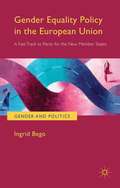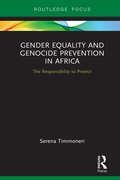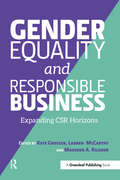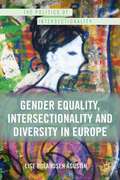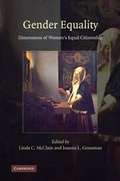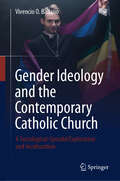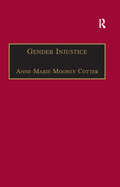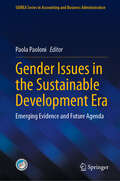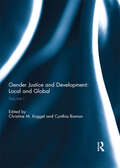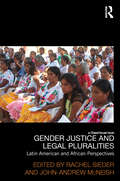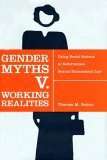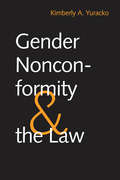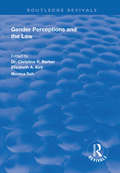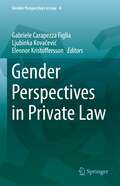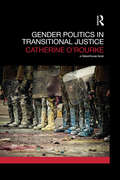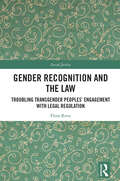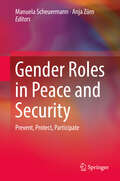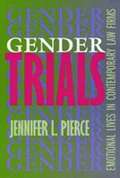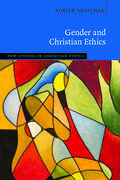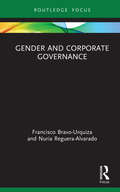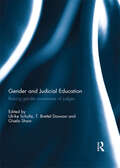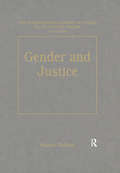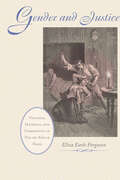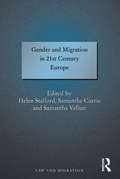- Table View
- List View
Gender Equality Policy in the European Union
by Ingrid BegoThis book examines the role that the European Union (EU) has played in enhancing democratic values in new member states by requiring the adoption of gender equality laws, such as equal employment and reconciliation policies, in return for membership. Considering four EU member states in Central Eastern Europe - Bulgaria, Czech Republic, Latvia and Poland - it debates if and under what conditions the incentives for EU membership positively affected the successful adoption and implementation of gender equality policies. The book looks at the role of formal and informal domestic institutions to understand successful alliances in each case study, and considers the dynamic relationship between domestic and international actors in the context of global governance. Engaging with the study of public policy, this book discusses how the EU is capable of successful promotion of human rights and democratic values in general and provides insight on how any supranational organization can establish effective incentive structures to produce desired outcomes.
Gender Equality and Genocide Prevention in Africa: The Responsibility to Protect
by Serena TimmoneriThis book investigates what impact gender equality has on genocide in Africa, to verify whether it is a missing indicator from current risk assessments and models for genocide prevention. Examining whether States characterised by lower levels of gender equality are more likely to experience genocide, Timmoneri adds gender indicators to the existing early warning assessment for the prevention of genocide. Moreover, the book argues for the formulation of policies directed at the improvement of gender equality not just as a means to improve women's conditions but as a tool to reduce the risk of genocide and mass atrocities. Using case studies from Nigeria, Ethiopia, Angola, Uganda, and Burundi, Timmoneri analyses recent atrocities and explores the role of gender equality as an indicator of potential genocide. Gender Equality and Genocide Prevention in Africa will be of interest to students and scholars of political science, genocide studies, and gender studies.
Gender Equality and Responsible Business: Expanding CSR Horizons
by Maureen A. Kilgour Kate Grosser Lauren McCarthyGender Equality and Responsible Business places gender equality at the heart of the responsible business agenda with the aim of contributing to CSR practice as well as research. Discussion about gender issues in the field of corporate responsibility has focused on workplace issues and corporate boards, which are important areas of work. However, the great benefit of exploring gender issues through a responsible business lens is that this requires us to also examine the wider gender impacts of business in the marketplace – for example, with regard to suppliers, supply chains, and consumers, and with respect to the communities where business operates, and the wider ecological environment – indeed throughout corporate value chains.Through contributions from practitioners in business and civil society, as well as academia, this book broadens the agenda, opening the field to new voices, and facilitates dialogue among and between practitioners and researchers. Contributions within the edited collection elucidate current practice, bring new perspectives, and help us to expand the field of responsible business with regard to gender equality, and beyond.
Gender Equality, Intersectionality, and Diversity in Europe (The Politics of Intersectionality)
by Lise Rolandsen AgustínGender is being marginalized with the increased attention to "multiple discrimination" and civil society landscape at the transnational level is increasingly diversified. The book looks at the processes of (strategic) degendering in EU policy-making and on the interaction between EU institutions and European women's organizations.
Gender Equality: Dimensions of Women's Equal Citizenship
by Linda C. Mcclain Joanna L. GrossmanCitizenship is the common language for expressing aspirations to democratic and egalitarian ideals of inclusion, participation, and civic membership. However, there continues to be a significant gap between formal commitments to gender equality and equal citizenship - in the laws and constitutions of many countries, as well as in international human rights documents - and the reality of women's lives. This volume presents a collection of original works that examine this persisting inequality through the lens of citizenship. Distinguished scholars in law, political science, and women's studies investigate the many dimensions of women's equal citizenship, including constitutional citizenship, democratic citizenship, social citizenship, sexual and reproductive citizenship, and global citizenship. Gender Equality takes stock of the progress toward - and remaining impediments to - securing equal citizenship for women, develops strategies for pursuing that goal, and identifies new questions that will shape further inquiries.
Gender Ideology and the Contemporary Catholic Church: A Sociological-Synodal Exploration and Inculturation
by Vivencio O. BallanoThis book sociologically investigates the contemporary Catholic Church’s stance on gender diversity and “gender ideology” and explores ways to adapt the social science perspectives on sex, gender, and gender fluidity in the Church’s moral teachings, applying Pope Francis’s inductive synodal theology. Using the sociological theories on gender, moral panics, and morality and drawing on secondary literature, media reports, and church documents, it specifically unpacks the “gender ideology’s” alleged grave threats to humanity, family, children, and human dignity as moral panics as well as examines the Catholic morality of gender-enhancement treatment and sex change. Ultimately, this book aims to inculturate or adapt the contemporary sociological gender theory and research in the Catholic Church’s moral doctrines as a synodal response to the “signs of the times.” It therefore appeals to church authorities, moral theologians, LGBTQI leaders, as well as scholars and students of sociology, religion, and gender studies.
Gender Injustice: An International Comparative Analysis of Equality in Employment
by Anne-Marie Mooney CotterGender equality and the importance of the law in combating discrimination are issues explored by this insightful work. Gender Injustice allows readers a better understanding of the issue of inequality and aims to increase the likelihood of achieving gender justice in the future. It investigates equality in employment for men and women in terms of the law, at both national and international levels, and looks at the primary role of legislation, which has an impact on the court process. It also discusses the two most important trade agreements of our day - namely the North American Free Trade Agreement and the European Union Treaty - in an historical and compelling analysis of women and equality. By providing a detailed examination of the relationship between gender and the law, the book will be an important read for those concerned with equal pay and equal access to employment.
Gender Issues in the Sustainable Development Era: Emerging Evidence and Future Agenda (SIDREA Series in Accounting and Business Administration)
by Paola PaoloniNowadays, sustainability is one of the main pillars for organizations' revamp and growth. Sustainability can be summarized as the set of actions based on the mutual respect of economic, environmental, and social interests. No action should be taken unless it simultaneously respects the interests of these three spheres.The 17 Sustainable Development Goals (SDGs) developed by the United Nations for the 2030 Agenda are moving in this direction. Among them, reducing diversity and strengthening women's empowerment are the main targets of Goal 5 "Gender Equality."This edited volume discusses three main topics: Diversity Management for Sustainable Governance of Organisation, Innovation and New Technologies for Sustainable Development of Enterprises Led by Women and Agri-food, Fashion, Luxury and Made in Italy in Sustainable Female Firms.
Gender Justice And Feminist Jurisprudence
by Dr Ishita ChatterjeeThis book is a need of a book on Gender Justice and Feminist Jurisprudence to deal with the subject on women rights. This book is a humble attempt to comply that need. The basic objective of this book is to provide the student, teachers and researchers topics on women related issues, their rights and obligations.
Gender Justice and Development: Volume I
by Christine M. Koggel and Cynthia BismanIt is now generally accepted by development theorists and policy-makers that the popular policies of reducing or eliminating social welfare programs over the past several decades have increased inequalities and injustices throughout the world. The authors in this collection focus on the gendered aspects of these inequalities and injustices. They do so by exploring the ethics, values, and principles central to understanding and alleviating real-world problems resulting from a lack of gender justice locally and globally.Some of the authors offer new theoretical and conceptual frameworks in order to analyze connections between gender norms and inequalities, to devise strategies to empower women and strengthen communities, to challenge mainstream understandings of justice and responsibility, to promote caring and just relationships among people within and across borders, or to shape more adequate accounts of development and global ethics. Other authors apply new theories and concepts in order to explore gender justice in the context of issues such as climate change, land ownership rights in Cameroon, or empowerment strategies in places such as Afghanistan, Bangladesh, Ghana, Columbia, and Indonesia. This book was originally published as a special issue of Ethics and Social Welfare.
Gender Justice and Legal Pluralities: Latin American and African Perspectives (Law, Development and Globalization)
by Rachel Sieder John-Andrew McNeishGender Justice and Legal Pluralities: Latin American and African Perspectives examines the relationship between legal pluralities and the prospects for greater gender justice in developing countries. Rather than asking whether legal pluralities are ‘good’ or ‘bad’ for women, the starting point of this volume is that legal pluralities are a social fact. Adopting a more anthropological approach to the issues of gender justice and women’s rights, it analyzes how gendered rights claims are made and responded to within a range of different cultural, social, economic and political contexts. By examining the different ways in which legal norms, instruments and discourses are being used to challenge or reinforce gendered forms of exclusion, contributing authors generate new knowledge about the dynamics at play between the contemporary contexts of legal pluralities and the struggles for gender justice. Any consideration of this relationship must, it is concluded, be located within a broader, historically informed analysis of regimes of governance.
Gender Myths v. Working Realities: Using Social Science to Reformulate Sexual Harassment Law
by Theresa M BeinerBoth the courts and the public seem confused about sexual harassment—what it is, how it functions, and what sorts of behaviors are actionable in court. Theresa M. Beiner contrasts perspectives from social scientists on the realities of workplace sexual harassment with the current legal standard. When it comes to sexual harassment law, all too often courts (and employers) are left in the difficult position of grappling with vague legal standards and little guidance about what sexual harassment is and what can be done to stop it. Often, courts impose their own stereotyped view of how women and men “ought” to behave in the workplace. This viewpoint, social science reveals, is frequently out of sync with reality.As a legal scholar who takes social science seriously, Beiner provides valuable insight into what behaviors people perceive as sexually harassing, why such behavior can be characterized as discrimination because of sex, and what types of workplaces are more conducive to sexually harassing behavior than others. Throughout, Beiner offers proposals for legal reform with the goal of furthering workplace equality for both men and women.
Gender Nonconformity and the Law
by Kimberly A. YurackoWhen the Civil Rights Act of 1964 was passed, its primary target was the outright exclusion of women from particular jobs. Over time, the Act's scope of protection has expanded to prevent not only discrimination based on sex but also discrimination based on expression of gender identity. Kimberly Yuracko uses specific court decisions to identify the varied principles that underlie this expansion. Filling a significant gap in law literature, this timely book clarifies an issue of increasing concern to scholars interested in gender issues and the law.
Gender Perceptions and the Law (Routledge Revivals)
by Christine R. Barker Elizabeth A. Kirk Monica SahPublished in 1998. This collection of papers, written by leading lawyers and sociologists in the UK, focuses on the relationships between gender and the law in the context of three areas of law: family law, criminal law and equal rights. The papers argue that gender roles within society affect the legal rights of individuals and impact on procedures they go through to enforce their rights or to gain redress for wrongs done to them. By failing to recognize the social and economic situations in which men and women are placed, the law perpetuates inequalities in their positions. Where attempts are made to ensure equality between the sexes, the result is often the exact opposite, because the legal system treats individuals as equals operating in a vacuum, ignoring the argument that equal treatment does not necessarily mean the same treatment, but can mean different treatment to ensure equality of result. Topics include: ¢ Disputes in the area of parental child custody rights ¢ The rights of surviving spouses to their deceased partner’s estate ¢ Theories for violent behaviour in women as contrasted with men ¢ Gender bias in criminal sentencing ¢ The role of European law in promoting sex equality in the work place ¢ Pornography and free speech ¢ Homosexuality as a civil right of citizenship
Gender Perspectives in Private Law (Gender Perspectives in Law #4)
by Eleonor Kristoffersson Gabriele Carapezza Figlia Ljubinka KovačevićThis book discusses prominent and controversial gender-related issues across the fields of family law, tort law, labour law, civil procedure law, ADR and private international law. An important critical assumption made by the authors is that the gender equality perspective has been largely neglected in several branches of private law, since scholars researching the intersection between gender and legal studies are mostly focused on public law and human rights law. In light of that, the book contributes not only to the deconstruction of gender-blind private law, but also to the development of a gender-competent analysis of the key branches of private law, starting with private international law. Gender perspective in family law is analyzed on the basis of gendered and heteronormative operations of family law with reference to the formation of legally recognized relationships, the establishment of legal parenthood, the division of marital property after a divorce, and the arrangements for post-separation parenting. Also, regulation of family matters in Indian society and the gender equality perspective from the principle of the child’s best interest are considered. As far as tort law is concerned, the book addresses compensation for damages suffered by women performing unpaid household work. Further, it contains papers dedicated to the following labour law issues: the genesis of labor law and its capacity to contribute either to worsening gender inequality in the world of work or to promoting gender equality; gender segregation in the labour market and its connection to family-friendly policies in the European Union; sexual harassment at work; and the impact of work digitalization on gender-related labour law issues. Lastly, the authors analyze gender equality in civil procedural law, as well as in mediation as a tool for encouraging the peaceful settlement of disputes. The book is intended to improve awareness of the wide range of private law issues that are important for understanding the ways in which gender inequality shapes everyday experiences, while also presenting critical considerations of the key private law instruments for achieving gender equality.
Gender Politics in Transitional Justice
by Catherine O'RourkeWhat role do transitional justice processes play in determining the gender outcomes of transitions from conflict and authoritarianism? What is the impact of transitional justice processes on the human rights of women in states emerging from political violence? Gender Politics in Transitional Justice argues that human rights outcomes for women are determined in the space between international law and local gender politics. The book draws on feminist political science to reveal the key gender dynamics that shape the strategies of local women’s movements in their engagement with transitional justice, and the ultimate success of those strategies, termed ‘the local fit’. Also drawing on feminist doctrinal scholarship in international law, ‘the international frame’ examines the role of international law in defining harms against women in transitional justice and in determining the ‘from’ and ‘to’ of transitions from conflict and authoritarianism. This book locates evolving state practice in gender and transitional justice over the past two decades within the context of the enhanced protection of women’s human rights under international law. Relying on original empirical and legal research in Chile, Northern Ireland and Colombia, the book speaks more broadly to the study of gender politics and international law in transitional justice.
Gender Recognition and the Law: Troubling Transgender Peoples' Engagement with Legal Regulation (Social Justice)
by Flora RenzAnalysing the strategies people use to resist, accept and respond to laws that attempt to shape not just their behaviour, but also their identity, this book pursues a critical engagement with legal gender transition. The Gender Recognition Act (GRA) has often been described as a groundbreaking and progressive legal framework for allowing people to legally change their gender. This book seeks to challenge this representation by drawing on in-depth qualitative interviews with trans people about the GRA. Theoretically this book uses the concepts of legal consciousness, agency and emotion to highlight the normative underpinnings of the GRA. Overall, the book contends, the GRA does not accurately reflect many trans people's own understanding of their gender identity or their sexuality. It is designed to create subjects that govern their behaviour and self-expression in a way that aligns with a purely binary model of sex/gender and sexuality. Although a deviation from these norms does not incur any direct punishment, it indirectly leads to a denial of rights and legal protections. By reviewing relevant legislation and case law, and through qualitative research, the book establishes how, instead of uncritically accepting or completely rejecting the GRA, trans people enact their singular identities by engaging strategically with law. This book will be of interest across a range of disciplines, including socio-legal studies, family law, gender, sexuality and law as well as sociology courses on gender, identity and social policy.
Gender Roles in Peace and Security: Prevent, Protect, Participate
by Manuela Scheuermann Anja ZürnThis volume examines the specific gender roles in peace and security. The authors analyse the implementation process of United Nations Security Council Resolution 1325 in various countries and discuss systemic challenges concerning the Women, Peace and Security agenda. Through in-depth case studies, the authors shed new light on topics such as the gender-related mechanisms of peace processes, gender training practices for police personnel, and the importance of violence prevention. The volume studies the role of women in peace and security as well as questions of gender mainstreaming by adopting various theoretical concepts, including feminist theories, concepts of masculinity, organizational and security studies. It also highlights regional and transnational approaches for the implementation of the Women, Peace and Security agenda, namely the perspectives of the European Union, NATO, the UN bureaucracy and the civil society. It presents best cases and political advice for tackling the problem of gender inequality in peace and security.
Gender Trials: Emotional Lives In Contemporary Law Firms
by Jennifer L. PierceThis engaging ethnography examines the gendered nature of today's large corporate law firms. Although increasing numbers of women have become lawyers in the past decade, Jennifer Pierce discovers that the double standards and sexist attitudes of legal bureaucracies are a continuing problem for women lawyers and paralegals. Working as a paralegal, Pierce did ethnographic research in two law offices, and her depiction of the legal world is quite unlike the glamorized version seen on television. Pierce tellingly portrays the dilemma that female attorneys face: a woman using tough, aggressive tactics--the ideal combative litigator--is often regarded as brash or even obnoxious by her male colleagues. Yet any lack of toughness would mark her as ineffective. Women paralegals also face a double bind in corporate law firms. While lawyers depend on paralegals for important work, they also expect these women--for most paralegals are women--to nurture them and affirm their superior status in the office hierarchy. Paralegals who mother their bosses experience increasing personal exploitation, while those who do not face criticism and professional sanction. Male paralegals, Pierce finds, do not encounter the same difficulties that female paralegals do. Pierce argues that this gendered division of labor benefits men politically, economically, and personally. However, she finds that women lawyers and paralegals develop creative strategies for resisting and disrupting the male-dominated status quo. Her lively narrative and well-argued analysis will be welcomed by anyone interested in today's gender politics and business culture.
Gender and Christian Ethics (New Studies in Christian Ethics)
by Adrian ThatcherIn this book, Adrian Thatcher offers fresh theological arguments for expanding our understanding of gender. He begins by describing the various meanings of gender and depicts the relations between women and men as a pervasive human and global problem. Thatcher then critiques naive and harmful theological accounts of sexuality and gender as binary opposites or mistaken identities. Demonstrating that the gendered theologies of Hans Urs von Balthasar and Karl Barth, as well as the Vatican's “war on gender” rest on questionable binary models, he replaces these models with a human continuum that allows for sexual difference without assuming “opposite sexes” and normative sexualities. Grounded in core Christian doctrines, this continuum enables a full theological affirmation of LGBTIQ people. Thatcher also addresses the excesses of the male/female binary in secular culture and outlines a hermeneutic that delivers justice and acceptance instead of sexism and discrimination.
Gender and Corporate Governance (Routledge Focus on Accounting and Auditing)
by Francisco Bravo-Urquiza Nuria Reguera-AlvaradoGender diversity as a corporate governance mechanism is high on the agenda for regulators, firms, and researchers. Particularly, gender board composition has received a great deal of attention in recent years. The theoretical foundations of the benefits associated with the inclusion of female directors on boards, how to measure gender diversity in the boardroom, and its real impact on board decisions and firm strategies remain hotly debated. Drawing on empirical data, this book summarises the current situation regarding gender board diversity and provides a concise overview of the most important concerns about this topic. This will be a vital tool to guide the future debate on gender diversity and corporate governance for researchers and advanced students, as well as regulators, policy makers and board members.
Gender and Judicial Education: Raising Gender Awareness of Judges
by Ulrike Schultz, T. Brettel Dawson and Gisela ShawJudicial Education has greatly expanded in common law countries in the past 25 years. More recently it has become a core component in judicial reform programs in developing countries with gender attentiveness as an element required by donor agencies. In civil law jurisdictions judges´ schools have long played a role in the formation of the career judiciary with a focus on entry to the judicial profession, in some countries judges get an intensive in-service education at judicial academies. Gender questions, however, tend to be neglected in the curricula.These judicial education activities have generated a significant body of material and experience which it is timely to review and disseminate. Questions such as the following require answers. What is the current state of affairs? How is judicial education implemented in developed and developing countries all around the world? Who are the educators? Who is being educated? How is judicial education on gender regarded by judges? How effective are these programs?The chapters in this book deal with these questions. They provide a multiplicity of perspectives. Six countries are represented, of these four are civil law countries (Germany, Argentina, Japan, Bosnia and Herzegovina) and two are common law countries (Canada; Uganda). This book was previously published as a special issue of International Journal of the Legal Profession.
Gender and Justice (The\international Library Of Essays In Law And Legal Theory (second Series) Ser. #2)
by Ngaire NaffineThe leading articles on gender and justice within Anglo-American legal theory are assembled in this volume. The essays are drawn primarily from the writings of lawyers working in the common law tradition and they mainly examine the justice of legal institutions. Due to the close kinship between political and legal theories of justice, the book also includes a selection of the work of the more prominent political theorists of justice and gender.
Gender and Justice: Violence, Intimacy, and Community in Fin-de-Siècle Paris (The Johns Hopkins University Studies in Historical and Political Science #128)
by Eliza Earle FergusonHistorian Eliza Earle Ferguson’s meticulously researched study of domestic violence among the working class in France uncovers the intimate details of daily life and the complex workings of court proceedings in fin-de-siècle Paris. With detective-like methods, Ferguson pores through hundreds of court records to understand why so many perpetrators of violent crime were fully acquitted. She finds that court verdicts depended on community standards for violence between couples. Her search uncovers voluminous testimony from witnesses, defendants, and victims documenting the conflicts and connections among men and women who struggled to balance love, desire, and economic need in their relationships.Ferguson's detailed analysis of these cases enables her to reconstruct the social, cultural, and legal conditions in which they took place. Her ethnographic approach offers unprecedented insight into the daily lives of nineteenth-century Parisians, revealing how they chose their partners, what they fought about, and what drove them to violence. In their battles over money and sex, couples were in effect testing, stretching, and enforcing gender roles.Gender and Justice will interest social and legal historians for its explanation of how the working class of fin-de-siècle Paris went about their lives and navigated the judicial system. Gender studies scholars will find Ferguson’s analysis of the construction of gender particularly trenchant.
Gender and Migration in 21st Century Europe (Law and Migration)
by Samantha CurrieProviding interdisciplinary and empirically grounded insights into the issues surrounding gender and migration into and within Europe, this work presents a comprehensive and critical overview of the historical, legal, policy and cultural framework underpinning different types of European migration. Analysing the impact of migration on women's careers, the impact of migration on family life and gender perspectives on forced migration, the authors also examine the consequences of EU enlargement for women's migration opportunities and practices, as well as the impact of new regulatory mechanisms at EU level in addressing issues of forced migration and cross-national family breakdown. Recent interdisciplinary research also offers a new insight into the issue of skilled migration and the gendering of previously male-dominated sectors of the labour market.
